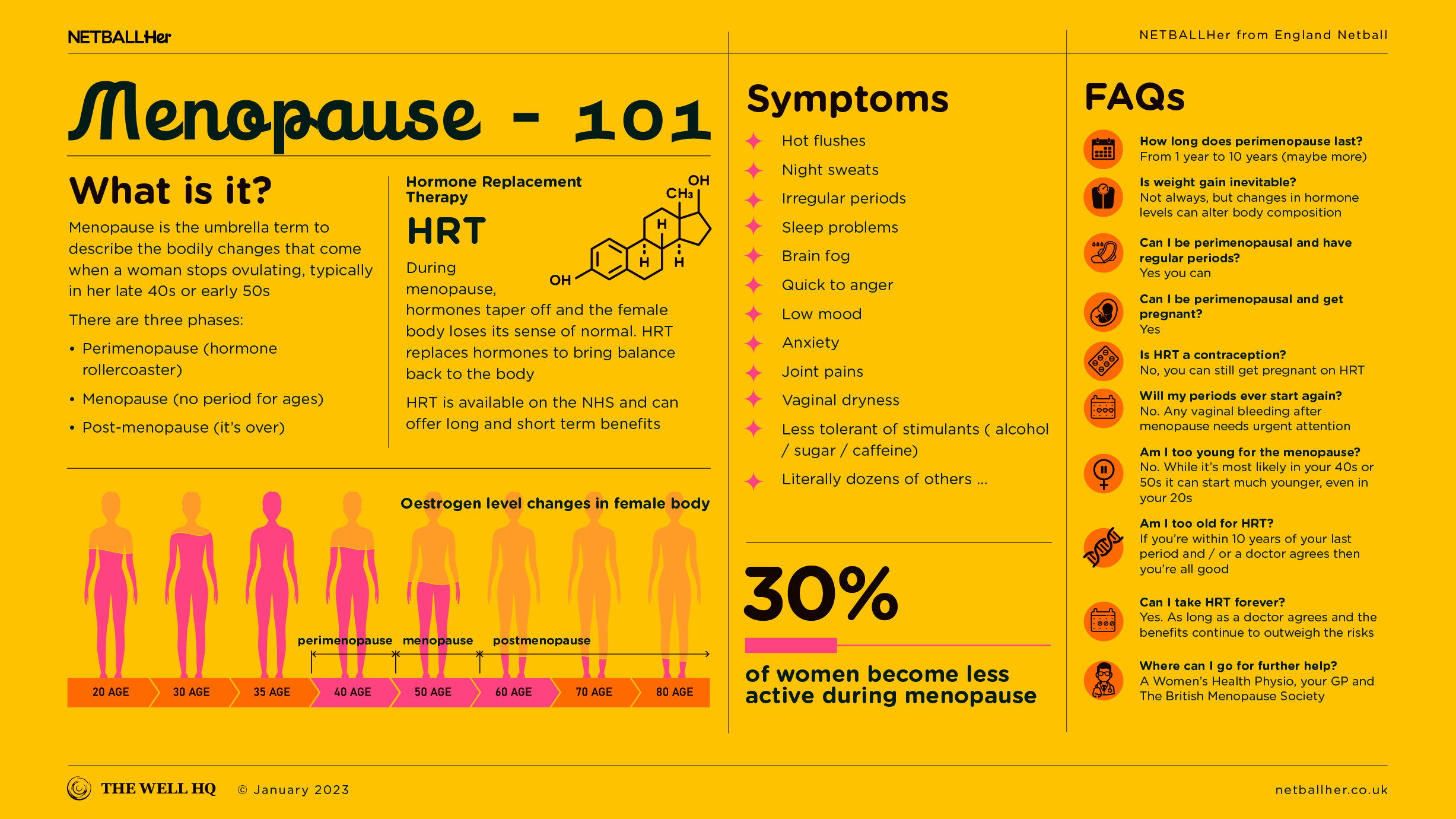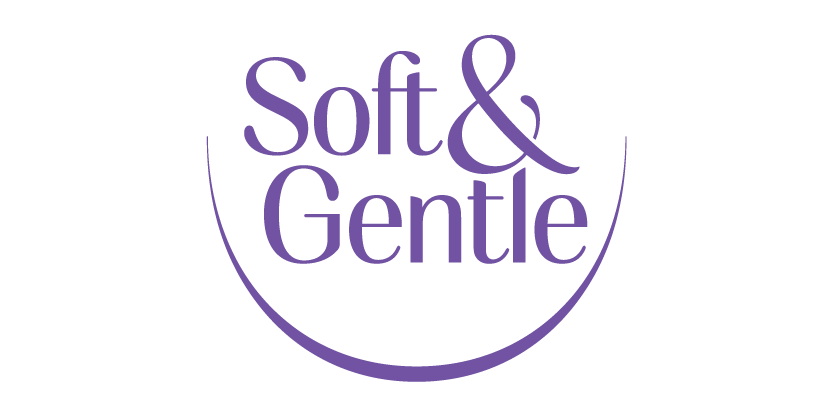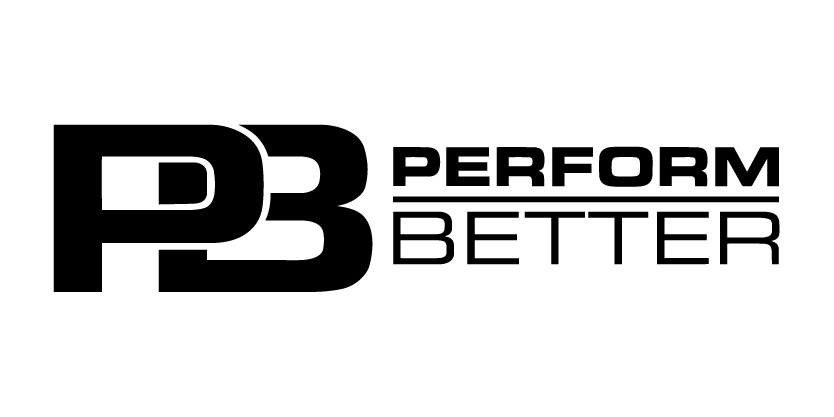Click play for an audio readthrough of this article
Thousands of England Netball members, coaches, officials and teammates are going through menopause right now … here’s what to know and how to help
I think we should all be taught how to support someone going through the menopause.
For one, we’ll all likely go through it, or to see a loved one go through it. For two, our teammates, colleagues and even acquaintances (not just our loved ones) would be a whole lot more comfortable on their menopause journey if we all knew and did a little more.
This article is how we can start that process. This is how we can support women on our teams, at our clubs, even at our day jobs, through one of life’s most unsettling chapters.
What’s the menopause?
The menopause is a normal, inevitable life stage when a woman’s sex hormones wind down; her ovaries no longer release eggs and, eventually, her periods stop.
The years leading up to when periods stop is actually called the perimenopause – the first of three distinct menopause stages. During this phase a woman’s sex hormones go on a rollercoaster ride that’s wildly different from the stable and predictable rhythm of the menstrual cycle she’s used to.
And it’s this volatility which can cause the many unwanted symptoms.
Are my teammates going through it?
You might think this article is relevant only to those who play netball alongside older / midlife women. Most people think that menopause begins in a woman’s late 40s or early 50s and by and large they’re right …
But I’ve got some numbers for you:
- Roughly 1 in 100 women going through a natural menopause are under 40.
- Roughly 1 in 1,000 are under 30.
- Roughly 1 in 10,000 are under 20.
If we guesstimate that England Netball Membership is about 100,000, it means that, as well as all the members of menopause age going through it, an additional …
- 1,000 members under 40 are in menopause now
- 100 members under 30 are are in menopause now
- 10 members under 20 are are in menopause now
That’s fairly sobering. And it really ramps up the need for us all to be a little more aware, regardless of who or how old our teammates are.
Why contribute?
The significant changes going on in a menopausal woman’s life, mind and body are so profound that they pose a real risk to her participation in netball.
In netball, players are incredibly lucky to have found a sport they love. Given female drop-out stats in sport during a girl’s teen years, it’s actually a bit of a miracle.
But the risk of dropout peaks again around midlife. With her extra stress, body-consciousness, lack of self-esteem, tiredness, aches, pains and symptoms … sport and exercise can be the earliest casualties as she tried to grind through menopause.
This is massively problematic for our clubs, for the game, and for the individual. Exercise and lifestyle are the best medicine for maintaining physical, mental and emotional health in midlife so we have to go further to maintain that link with the sport she loves.
We need to think about creating a culture of support for midlife women – and that’s something we can all contribute to.
Six top tips for supporting teammates in menopause
After reading these tips, check out our guide on how to coach midlife women for more.
1. Learn a little of what she’s going through
You’re on this website so that’s a great start. One of the euphemisms for menopause is The Big Change … and as much as it’s a cliche, it’s very apt.
Menopause brings physical, emotional and mental changes, and those changes can manifest – at least for a time – in every corner of life: social life, sex life, food life, health and mental health, work life, home life, sport life, sleep life …
So learn a little of what she’s going through and you’ll be a more useful colleague and friend if and when she needs support, encouragement, or just a listening ear.
2. Listen, ask questions
Menopause is, or can be, an isolating phase of life so please take time to check in with your teammates and really listen to what’s going on with them. Paraphrase what you hear back to them to show you’ve listened and understood, and ask questions to show that you’re curious and you care. Don’t judge, just listen.
Most likely you’re not going to have instant answers or solutions, but by simply acknowledging her and engaging with her challenges and frustrations you’ll validate her experiences so she feels seen and believed. You’d be surprised how many women suffer in silence or have their experiences dismissed or diminished.
3. Show empathy
A lot of people confuse sympathy and empathy. Sympathy is I feel bad/ sorry for you and empathy is I can relate to what you’re going through.
So empathy is a two-way street. It’s a way of communicating that says, it’s not just you. And you don’t have to have been through or be going through menopause to empathise with someone who is. As women, we can probably all relate to feeling shame, or lost, or judged, or stigmatised around our bodies and our health.
No one’s saying you have to spill your life story, you decide how much you share, but opening up is (or can be) valuable to both sides.
So mention your leaking urine; menstrual cycle issues; pregnancy and childbirth; embarrassing health problems; social fears; body issues; feeling ignored … share your experiences and vulnerabilities to create a relevant and meaningful emotional connection.
4. Practical help
The first thing to say is that women in menopause are at a particularly high risk of dropping the sport they love. Netball can start to feel more and more droppable as symptoms/ fear/ life/ changes take over.
So for the sake of the team as well as the individual we can all contribute to keep dropout to a minimum. Think about little things such as Caught Short Kits in bathrooms, changing rooms and kitbags, and make sure there’s sufficient breaks built into training and matchdays.
Take an informed approach into situations that could be difficult for her, too. For example, if she loses her train-of-thought (brain fog) mid-conversation then you can step in to help (quickly and gently guide her back to where she was) before it becomes a source of embarrassment.
5. Matters of policy
When the club/ team are discussing matters of policy, please add extra weight to what menopausal women are saying / feeling. Some of the key reasons given as to why dropout is so rife among midlife women concern the kit: light colours (leaking) and skimpy dresses (body issues) aren’t ideal when confidence is wavering.
As said, netball starts to look easily droppable as stress mounts, and problems at home, at work, with sleep etc start to pile up. So if there are practical measures you can take (lifts to and from training) that make her life easier then try to help out if you’re able.
6. Celebrate them
The above suggestions might all sound a bit doom and gloom but the most important thing of all is to celebrate your menopausal teammates!
Yes, the symptoms can be challenging. Sure, it might not feel like the best time in her life, but as teammates we can all see and celebrate the brilliant bits of others, and remind everyone how inspirational, valued and plain awesome they are.
Don’t join them for a pity party, stay positive. Get them out of a rut and into the groove. Menopause comes to us all – so help a teammate navigate hers with as much joy and encouragement as possible.
As a reminder, the content of the course belongs to The Well HQ. You have permission to access and use the content yourself or, if you are an organisation, for the number of users selected, but are not otherwise permitted to share such content with others, all in accordance with our Course Terms and Conditions.


























